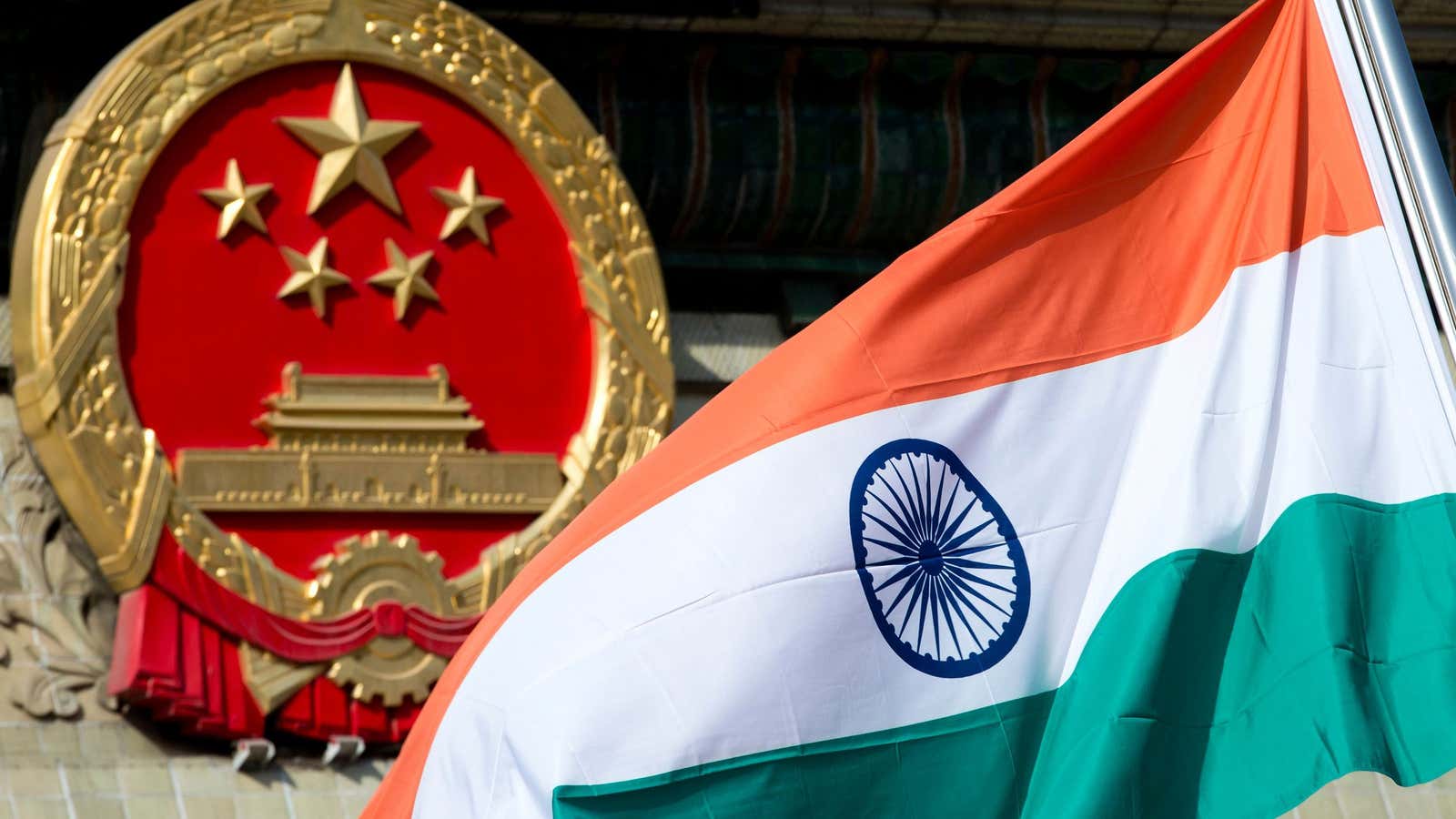China’s two technology behemoths, Alibaba and Tencent, have been aggressively snapping up stakes in Indian startups in the last five years—and many of the firms they’ve helped fund have crossed the $1 billion threshold to become unicorns.
Overall, Alibaba and its fintech affiliate Ant Financial, have invested in at least six Indian startups, five of which have become unicorns. For Tencent, the number is 12, of which seven have achieved unicorn status, according to tallies made by Quartz. This means the two companies have divvied up almost half of the 31 unicorns India has so far, according to a report issued last month by Iron Pillar, an India-focused Mumbai-based investment firm.
The two giants’ bets on Indian startups come against the backdrop of surging investment interest from Chinese investors—amid tensions with the US and Europe over tech investments—and also reflect their fierce competition across multiple sectors both at home and overseas.
“Both Alibaba and Tencent are making very long-term focused investments in India, taking positions in consumer tech companies, which are going to be massive in the medium to long term,” Anand Prasanna, a managing partner at Iron Pillar told Quartz.
Mapping Tencent and Alibaba’s investment universe
Starting in 2015, Alibaba and Tencent began placing big bets on e-commerce, on-demand services and mobile payments in India, extending their rivalry in those segments in China. That year, Alibaba and Ant (which itself is valued at over $150 billion) invested an undisclosed amount in Paytm, India’s largest mobile payments company, while Tencent led a $90 million funding round for Practo, one of India’s largest referral services for doctors.
Their statements announcing those early deals captured the thinking behind their investment strategies in India.
Chen Hongwei, then a senior director of Tencent’s investment department, said the company was looking for “ambitious, visionary” Indian internet startups that can improve people’s lives, according to a news release at the time. Meanwhile Alibaba’s CEO Daniel Zhang, who in September replaced Jack Ma to become the company’s chairman, said Alibaba was looking to further expand its global footprint to tackle India’s “thriving mobile commerce market.”
In general, Alibaba is making more concentrated bets on a few companies like Paytm as an anchor and taking larger ownership, while Tencent is taking multiple bets, pursuing smaller ownership in multiple companies, said Prasanna.
To date, Alibaba, with Ant, has invested in Indian companies that reflect its reach in China, including Paytm Mall, an online retail place under Paytm, food delivery app Zomato, online grocer Bigbasket, e-commerce platform Snapdeal and logistics firm Xpressbees. Apart from Xpressbees, which does not reveal its valuation, all the other five firms have achieved unicorn status, valued between just over $1 billion (Bigbasket and Snapdeal) to a whopping $16 billion (Paytm). Alibaba is the single largest shareholder of Paytm.
Tencent, meanwhile, has invested in some of the strongest rivals of the firms that have received money from Alibaba. For instance, Tencent has invested in Swiggy, which is engaged in a food delivery fight with Zomato, as well as in Flipkart, the largest e-commerce platform in India, which Walmart bought last year as it competes with Amazon. The US e-commerce giant exceeds both Snapdeal and Bigbasket in terms of sales in India. Other unicorns Tencent has invested in include messaging app Hike, ride-sharing firm Ola, learning app BYJU’s, fantasy football platform Dream11 and B2B trading platform Udaan.
It is difficult to calculate the total amount the two have put in Indian startups, as most of the funding rounds include other investors, such as SoftBank.
Although it’s too early to tell which company has the upper hand in India’s tech scene, Alibaba is reportedly reviewing its investment activities in India as the company is disappointed at the performance of some of its bets and wants to adopt a wait-and-see approach, according to Indian financial newspaper Mint. Alibaba and Tencent did not reply to requests for comment.
“China 10 years ago”
Overall, Chinese investment (including money from not only venture capital firms but all China-based entities) in India has reached $8 billion as of Dec. 11 for 2019, compared with under $200 million a decade ago, according to Bengaluru-based startup tracker Tracxn. Chinese interest in India surged in 2014, when Chinese investment jumped from $214 million in 2013 to $3.2 billion.
Chinese investment in India has been accelerating due to a raft of factors: growing suspicion toward Chinese capital in the US, China’s top investment destination; a slowing Chinese economy that has prompted companies to look at emerging markets for growth; as well as the meteoric growth of India’s internet users to more than 450 million monthly active users. New Delhi, meanwhile, hasn’t expressed the kinds of security concerns over Chinese technology and Chinese investment that are now widespread in Washington.
Other Chinese investors that have become active in India in recent years include smartphone maker Xiaomi, which has invested in sectors like entertainment and mobile apps, and Chinese conglomerate Fosun, which has invested in more than five Indian startups, including logistics firm Delivery and booking website ixigo.
“The growth model of Indian startups is very similar to their Chinese peers. For instance, Flipkart is similar to China’s JD.com, Zomato is like China’s on-demand service app Meituan Dianping and Ola is like Chinese ride hailing giant Didi Chuxing,” said Ying Wei, a managing director at CDH Investments, one of China’s largest investment firms that has been focusing on India since 2015, in an interview with Chinese media.
For many Chinese investors, India reminds them of China during the 2000s when the country experienced the emergence of its first generation tech champions—and investors hope that with the right bets they’ll be cultivating India’s own Alibaba or Tencent.
